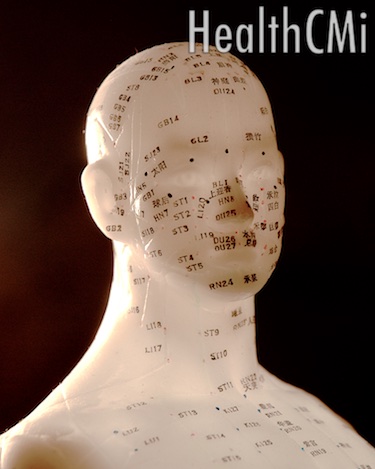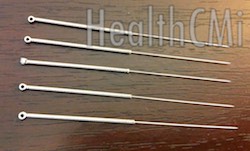Acupuncture relieves Parkinson’s disease symptoms. Researchers document the ability of acupuncture to reduce pain, anxiety, depression, hot flashes and abnormal sweating in a clinical case history. The patient responded with significant positive patient outcomes after a 2 week regime of acupuncture treatments given at a rate of five days per week. 
Parkinson’s disease is a progressive nervous system disorder affecting movement. Changes include the onset of tremors, slowness of movements, shuffling, difficulty swallowing, fainting, reduced arm sway, rigidity and dysfunction of speech and gait. There is no known biomedical cure but medications including levodopa, COMT inhibitors, MAO-B inhibitors, dopamine agonists and other medications are used to control symptoms. Surgical interventions include the implantation of deep brain stimulators.
Acupuncture successfully reduces pain, autonomic nervous system dysfunction, and mental illness in Parkinson’s disease patients. Researchers from the Aizu Medical Center (Fukushima Medical University) delivered the patient care and collected the data. Additional support and came from an investigator at the Department of Neurology, Hematology, Metabolism, Endocrinology and Diabetology (Yamagata University).
The case history documents acupuncture’s ability to address specific concerns of an 81 year old female patient suffering from Parkinson’s disease. Complications included a history of hypertension and lumbar fracture. The patient had been prescribed medications including anti-inflammatory and psychiatric drugs. Her symptoms persisted and acupuncture was initiated.
Manual acupuncture was applied at acupuncture points: LR3, LI4, KI5, KI7, SP6, GB34, BL18, BL15, GB20. Needles were retained for ten minutes per session. Electroacupuncture at 1 Hz for 7 minutes was applied to: KI10, LR9, BL23, BL25. The researchers note that the electroacupuncture was applied to relax the muscle tension. Seirin brand acupuncture needles of 40 - 50 mm length and 0.14 - 0.18 diameter were used. The researchers note that Traditional Chinese Medicine (TCM) theory guided the needle selection process. UB15, LR3, and SP6 were chosen for their ability to treat both depression and anxiety. LR3, KI7, BL18, and GB34 were chosen for their ability to treat hot flashes and paroxysmal sweating.
The researchers note that the patient's lower leg pain decreased. Hot flashes and paroxysmal sweating incidences reduced. The patient showed very significant reductions in depression and anxiety scores. In addition, her “steps became larger” and there was a significant reduction in bradykinesia, a complication often correlated with Parkinson’s disease characterized by slowness and impairment of movements and reflexes.
In related research, University of Arizona doctors find acupuncture effective for the treatment of balance and gait disorders in Parkinson’s disease patients. The research team from the surgery and neurology departments measured significant clinical improvements in overall balance, gait speed and stride length. The results were published in Neurology, the official journal of the American Academy of Neurology.
Patients were randomly assigned to an acupuncture group or a control group. The acupuncture group received electroacupuncture. The control group received sham acupuncture to rule out variables including the placebo effect. Patients received one treatment per week for three weeks and each treatment duration lasted a total of 30 minutes.
Objective measurements were taken from various positions and during many types of activities. Balance measurements included assessment of the relationship between the mediolateral center of mass sway with the anteroposterior sway. These measurements were taken with the eyes open, closed and during multitasking. Gait measurements were taken during fast walking, postural transitions and related activities.
The researchers tabulated the results and measured an overall improvement in balance by 31% in the acupuncture group. Gait speed improved by 10% and stride length increased by 5% for patients receiving true acupuncture. Control group patients showed no improvements.
Balance, gait and stride length significantly improved due to the application of electroacupuncture. Use of a sham acupuncture control group eliminated the possibility of the placebo effect in the final results. As a result, the University of Arizona doctors conclude, “EA (electroacupuncture) is an effective therapy in improving certain aspects of balance and gait disorders in PD (Parkinson’s disease).”
Herbal medicine research reveals benefits for Parkinson’s disease patients. That the herbal formula Yi Gan San exhibits neuroprotective effects and rescues dopaminergic neurons from toxicity. The Acupuncture & Meridian Science Research Center at Kyung Hee University conducted research showing that Yi Gan San is correctly used for the management of neurodegenerative disorders. Yi Gan San showed significant neuroprotection in an induced Parkinsonian mouse model. The study notes that “in the mouse Parkinson's disease model, treatment with Yi-Gan San also significantly improved motor functioning and prevented dopaminergic loss.” 
In another study, The Journal of Brain Disease reported that Yi Gan San may be helpful in treating schizophrenia and many neuropsychological disorders because it has been shown to restore glutathione levels in the brain. In yet another study published in Progress in Neuro-Psychopharmacology and Biological Psychiatry, the Shimane School of Medicine concluded that Yi Gan San is a serotonin modulator and is a “safe and useful” formula for treating behavioural and psychological symptoms of dementia and borderline personality disorder. That study also shows a statistically significant improvement in tardive dyskinesia, psychosis, schizophrenia,
Yi Gan San (Restrain the Liver Powder) contains Dang Gui, Fu Ling, Bai Zhu, Gou Teng, Chuan Xiong, Chai Hu, and Gan Cao. The formula is often used for headaches, dizziness, anxiety, panic attacks, teeth grinding, chills & fever, seizures, palpitations, infantile epilepsy, disturbed dreams, insomnia, and spasms. Traditionally, this formula quells rebellious Liver Qi and treats Liver Blood deficiency. Biomedical and traditional perspectives agree that Yi Gan San has neuroprotective benefits.
References:
Iseki, Chifumi, Taiga Furuta, Masao Suzuki, Shingo Koyama, Keiji Suzuki, Tomoko Suzuki, Akiyo Kaneko, and Tadamichi Mitsuma. "Acupuncture Alleviated the Nonmotor Symptoms of Parkinson’s Disease including Pain, Depression, and Autonomic Symptoms." Case Reports in Neurological Medicine 2014 (2014).
Lei, Hong, Nima Toosizadeh, Michael Schwenk, Scott Sherman, Stephen Karp, Saman Parvaneh, Esther Esternberg, and Bijan Najafi. "Objective Assessment of Electro-acupuncture Benefit for Improving Balance and Gait in Patients with Parkinson’s Disease (P3. 074)." Neurology 82, no. 10 Supplement (2014): P3-074.


